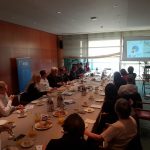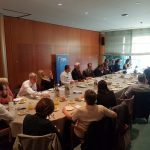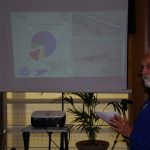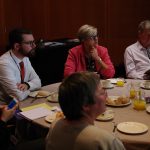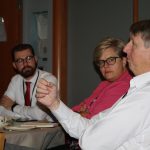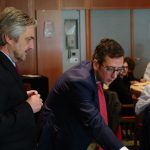26 September 2018 | Brussels, Belgium
The European Union Road Federation (ERF) and the Federation of European Motorcyclists’ Associations (FEMA) organised a breakfast event “‘Road Infrastructure Safety – The Motorcyclists’ Vision”. The event took place at the European Parliament and was hosted by MEP Wim van de Camp.
In the coming months, road safety will be at the EU agenda with the revision of the Road Infrastructure Safety Directive and the preparation of the coming Road Safety Action Programme 2020-2030. In this sense, the ERF and FEMA have launched a joint position paper ‘Improving infrastructure safety for powered two-wheelers’ that calls for specific measures focused on motorcycle protection.
Only in 2017 power two-wheelers fatalities (motorcycles and mopeds) counted for 17% of the total road victims, while accounting only for 1,8% of the total traffic flow. Both ERF and FEMA strongly believe that road safety for motorcyclists can be improved by looking at the design of road infrastructure.
In his introduction, Mr Van de Camp referred to the social cost of accidents that authorities need to take into consideration, as well as how responsibility is shared among involved parties in case of an accident.
Afterwards, Dolf Willigers, FEMA General Secretary, gave a presentation regarding the challenges that motorcyclists’ face in terms of infrastructure. More specifically, Mr Willigers pointed out that lack of proper design and poor maintenance can have fatal consequences for vulnerable road users, motorcyclists included.
Following the motorcyclist’s perspective, the ERF President, Rik Nuyttens, addressed a presentation on how the infrastructure can be adapted to better accommodate the needs of the above mentioned road user groups by improving signs, markings, bariers and pavements.
The last part of the event was dedicated to an exchange of views between the participants. The main point made during this discussion was that although maintenance is important, this is mostly funded by regional and national authorities, therefore it is important that these authorities are constantly informed about the needs of road users, especially the vulnerable ones. Another important element, which participants agreed on, was that harmonised road equipment is extremely important when it comes to preventing road accidents and thus preventing road fatalities.
ERF and FEMA will continue the awareness campaign during the coming months presenting the document in specialised fora, conferences and to other stakeholders involved in road safety.
Photo gallery
-
Improving infrastructure safety for powered two wheelers
June 12, 2018

